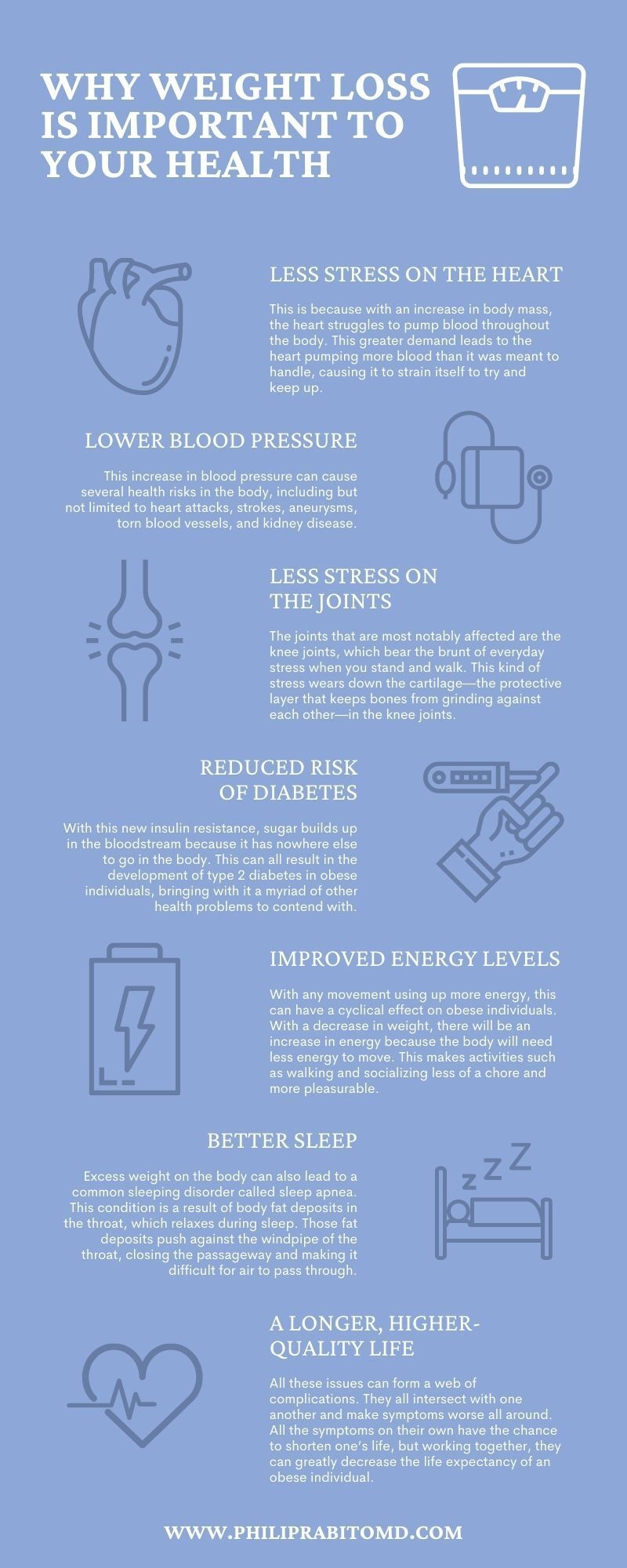
Many complications stem from obesity, including problems with the heart, the blood vessels, the joints, and sleeping, to name a few. Too much weight affects all aspects of the body, lowering one’s life expectancy and lowering one’s quality of life. These are the reasons why weight loss is important to your health—without proper care, the harm to your body can be irreversible.
Less Stress on the Heart
Obese individuals need more blood to supply oxygen to the body. This is because with an increase in body mass, the heart struggles to pump blood throughout the body. This greater demand leads to the heart pumping more blood than it was meant to handle, causing it to strain itself to try and keep up. This kind of stress can lead to heart failure due to the organ being so overworked for too long.
Less weight in the body means the heart has less work to do in transporting blood. The only real solution for heart problems in obese individuals is to lose the amount of weight their doctor recommends.
Lower Blood Pressure
Another of the repercussions of excess weight is higher blood pressure. As we mentioned before, obese individuals need more blood, which results in higher blood pressure. This increase in blood pressure can cause several health risks in the body, including but not limited to heart attacks, strokes, aneurysms, torn blood vessels, and kidney disease.
Like the risk of heart failure, the only reliable solution to lowering the threat of high blood pressure is to lose weight with a healthy change of lifestyle.
Less Stress on the Joints
The stress on the body isn’t limited to the heart; it affects the joints as well. The joints that are most notably affected are the knee joints, which bear the brunt of everyday stress when you stand and walk. Each extra pound on the body is estimated to put four pounds of pressure on the knees, making them struggle more as obese individuals walk and go about their daily lives. This kind of stress wears down the cartilage—the protective layer that keeps bones from grinding against each other—in the knee joints. This loss of cartilage can lead to osteoarthritis, making everyday movements more painful.
Less weight means less stress on the joints. Losing weight promotes greater knee health and reduces pain and inflammation in common everyday activities.
Reduced Risk of Diabetes
With increased weight, the way in which insulin interacts with the body changes. With this new insulin resistance, sugar builds up in the bloodstream because it has nowhere else to go in the body. This can all result in the development of type 2 diabetes in obese individuals, bringing with it a myriad of other health problems to contend with.
One complication of diabetes is cardiovascular disease, which increases problems with the heart. This can compound with other health risks: kidney damage can result, with diabetes damaging the filtering system the kidneys provide. This can cause kidney failure, which would need either dialysis or a kidney transplant.
Increased risks to the feet are some of the most common symptoms of diabetes. Because of poor blood flow, the feet—some of the furthest extremities from the heart—don’t get the amount of blood they need to sustain themselves. This increases the risk of infection due to cuts and commonly results in the amputation of toes, the foot, or the entire leg, depending on the severity of the infection.
Several factors can cause diabetes, but it has been shown that obesity is linked to diabetes diagnoses. People who suffer from obesity have a higher chance of developing diabetes, due in part to weight, poor dietary choices, and lack of physical activity.
Improved Energy Levels
With the increase of mass in the body, more energy is required to move the body. With any movement using up more energy, this can have a cyclical effect on obese individuals. If moving is harder for them, then they may move less. If they move less, then they may gain more weight due to inactivity. This will have harmful repercussions as they become stuck in a cycle of unhealthy habits that they feel they can do nothing about. This type of behavior may even result in individuals becoming completely stationary at home or even bedridden.
With a decrease in weight, there will be an increase in energy because the body will need less energy to move. This makes activities such as walking and socializing less of a chore and more pleasurable.
Better Sleep
Excess weight on the body can also lead to a common sleeping disorder called sleep apnea. Sleep apnea is characterized by obstruction of the body’s airways while one is asleep. The blocked airways result in loud snoring, trouble breathing, gasping for air, and difficulty going to sleep and staying asleep.
This condition is a result of body fat deposits in the throat, which relaxes during sleep. Those fat deposits push against the windpipe of the throat, closing the passageway and making it difficult for air to pass through.
Like many of the symptoms of obesity, sleep apnea can result in other complications that may compound with other health risks. Beyond problems with high blood pressure and diabetes, this disturbance of sleep can cause irritability and fatigue during the day. Obese individuals may have a harder time sleeping comfortably and wake up sore, exhausted, and irritated.
A Longer, Higher-Quality Life
All these issues can form a web of complications. They all intersect with one another and make symptoms worse all around. All the symptoms on their own have the chance to shorten one’s life, but working together, they can greatly decrease the life expectancy of an obese individual.
Medical complications, physical difficulties, lack of energy, and a general daily discomfort during the day and night may mar the life of an obese individual. At the end of the day, weight loss is important to your health because the length and quality of your life could suffer greatly otherwise. Thankfully, there are resources to manage weight loss, whether they come in the form of diet, exercise, or a combination of both. Specialists can help you formulate a weight loss plan if you don’t know where to begin. A dietician will help with healthy meals, and a physical trainer can aid in exercise routines.
Weight gain may even be due to hormonal disorders, which will require the aid of a specialist. Dr. Philip Rabito, MD , is among the top endocrinologists in NYC, utilizing new techniques to treat patients who suffer from hormonal imbalances.


